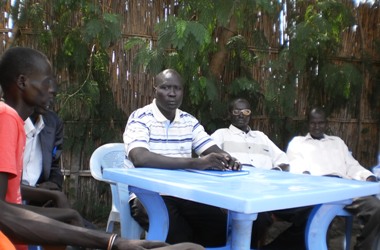Unity: Payinjiar removes education director after corruption allegations
By Bonifacio Taban Kuich
October 25, 2012 (BENTIU) – Payinjiar County’s education director has been removed after he was accused of corruption by local teachers who say they have gone unpaid forcing schools in the area to close.

Payinjiar County teachers voiced their concerns over Gabriel Hon Makuei, the former education director, to Unity State’s Deputy Governor after the ministry of education ignored and tried to silence their protests.
Teachers accused the outgoing director of fueling internal conflicts between the teachers in the County. Last month a team composed of 25 teachers approached the state minister of education Them Machar Kuol demanding Makuei’s removal, but the minister declined to take action and referred them to the office of Deputy Governor.
The Minister has been under pressure, the teachers say, not to remove the education director Samuel Lony Geng, who is Unity State’s Minister of Agriculture and Forestry and the Deputy Chairperson of the South Sudan’s ruling party – the SPLM – in Unity State.
The teachers told Sudan Tribune that they had feared arrest due to the stand off between them and high-level politicians.
Payinjiar County lies in a remote area of Unity State, and is largely inaccessible due to poor roads. The teachers claim that around 8 schools were closed down in Nyal Payam [district]. The teacher presented several petitions to the Education Minister but no action was taken until they approached Deputy Governor Micheal Chiangjiek Geay.
On Wednesday the Minister issued a decree and appointing a new education director but insisted that the allegations of corruption against Makuei were false.
“This is not true that we change the county director because he was involved in doing wrong things in the county, but I only make reshuffling through administrative office procedure”, said Kuol.
However, Abraham Char Mabor headteacher of Makur Girls Primary School in Payinjiar County said the former county education director took teacher’s salaries. If they were allowed by the education ministry, Mabor added, the teachers would open case against the former county director.
The minister could not claim ignorance of the situation, he said, because “he is the minister a big boss”.
The process of alerting the authorities took some months, Mabor said, accusing the County Commissioner and the Deputy Chairperson of SPLM of supporting the former county education director.
The newly-appointed Payinjiar County education directors Michael Lot Gatluok said that he hopes to unify the teachers in the area and improve education in the county..
He said that the worst part of the episode to remove Makuei was that he was protected by senior Unity State politicians due to their political interest rather than the future of Payinjiar’s children.
Such politics will “bring destruction to the communities that is why you have heard many schools have been closed”, added Gatluok.
“As the new county education director is to work hands in hands with my teachers, all of them are my colleagues and brother and will not single out individual teachers and I will not make any revenge [on anyone who collaborated with the former director…]. They are all my teachers I will mobilize them motivate them and to bring back the change in the community so that the kids will get education”, Gatluok said.
In Payinjiar there were 36 schools but due to misunderstanding between the former county director and teachers, only 9 schools were in operation. The new county education director says he will make sure all these school will be reopened and hope to build and expand schools.
Education standards in South Sudan are very poor as the country as a result of decades of civil war and underinvestment. Only 27% of the population can read and write.
After South Sudan’s independence last year the new nation is developing its own education syllabus. However lack of trained teachers and low salaries are pushing many literate South Sudanese to work for international organisations rather than work as teachers.
(ST)
